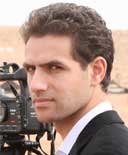Environmentislam |
Book review of Green Deen by Author Ibrahim Abdul-Matin
Everything is connected. The bottled water is linked to the fresh water streams that are controlled by large corporations; to the factories that manufacture the toxic plastics for the bottles; and to the communities it employs, pollutes, and - at times - destroys. What we consume, and how we use and abuse the environment is also connected to our relationship with the Creator of all things, God; at least that is the message of the newly published book, Green Deen: What Islam Teaches About Protecting the Planet, by Ibrahim Abdul-Matin.
However, Green Deen is not about blaming mankind for its damage of the planet, but about acknowledging the damages. Abdul-Matin explains what Islam teaches about the environment, what Muslim-Americans are doing to improve the world around them, and what needs to be done to maintain the balance of the tangible and intangible.
Conversations about the climate change, pollution, and organic feeding have been heard in many circles in the United States with efforts to correct or deny human negligence. After all, America, home to only five percent of the Earth’s population, is responsible for 25 percent of the entire world’s waste. Religious leaders have often shied away from any discussions regarding the environment, or feverously rejected the effects of mankind. Such discussions may have seemed to be missing from the discourse of the Muslim communities.
Green Deen responds to religious misunderstandings of the power mankind has in relation to the planet with a verse from the Holy Qur’an,
Corruption has appeared on the land and in the sea because of what the hands of humans have wrought. This is in order that we give them a taste of the consequences of their misdeeds that perhaps they will turn to the path of right guidance. (Qur’an 30:41)
Respect for the environment does not only benefit the world around us directly, it is also an obligation of the believers in Islam.
The author, Ibrahim Abdul-Matin, says, “The Earth is a mosque,” and it needs to be treated and respected as that. He was raised in New York City and recalls his father teaching him what Prophet Muhammad (peace be upon him) taught others. “’Where ever you may be at the time of prayer, you may pray, for it (the Earth) is all a mosque.’” At that point, in his adolescent stage in his life, Abdul-Matin made the connection. “The Earth is a mosque; a mosque is sacred; therefore, the Earth is sacred.”
Green Deen is both a “spiritual” and “scientific” path with six principles: understanding the Oneness of God and His creation (tawhid); seeing signs of God (ayat) everywhere; being a steward (khalifah) of the Earth; honoring the covenant, or trust, we have with God (amana) to be protectors of the planet; moving toward justice (adl), and living in balance with nature (mizan).








 Ehab Zahriyeh is a US-based multi-media journalist and freelance correspondent for Press TV who recently covered the Egyptian revolution. Besides, he has reported from Palestine/Israel including the Gaza Strip; Jordan; and Morocco. He began his careers in journalism at NY1 News as a video journalist where he worked for almost two years.
Ehab Zahriyeh is a US-based multi-media journalist and freelance correspondent for Press TV who recently covered the Egyptian revolution. Besides, he has reported from Palestine/Israel including the Gaza Strip; Jordan; and Morocco. He began his careers in journalism at NY1 News as a video journalist where he worked for almost two years.
Post new comment